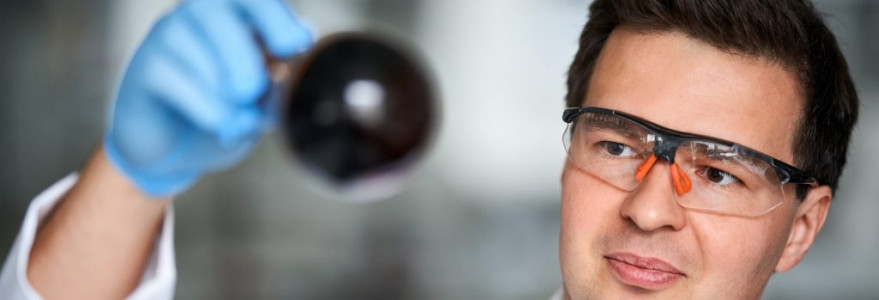On 9th October, the National Science Centre announced the winners of its annual award for outstanding scientists employed and performing basic research in Poland. The award in the science and technology category was received by Prof. Wiktor Lewandowski from the Faculty of Chemistry at the University of Warsaw.
This year’s National Science Centre (PL: Narodowe Centrum Nauki, NCN) Prize award gala took place on 9th October at the Manggha Museum of Japanese Art and Technology in Kraków. The award has been granted since 2013 to academics employed in Poland who have achieved significant successes in basic research. The award of PLN50 000 each year goes to representatives of three groups of disciplines: humanities, social sciences and arts, life sciences and science and technology.
Materials chemist
The winner of the NCN Prize 2024 in the category of science and technology is Prof. Wiktor Lewandowski, head of the Laboratory of Organic Nanomaterials Synthesis at the UW’s Faculty of Chemistry.
“It is very much a team award. These days, it would be very difficult to do research alone. The joint effort of the students, doctoral candidates and fellow researchers working with me has contributed to this success. The NCN award is, on the one hand, a huge distinction and appreciation of the work done so far, and on the other hand, an encouragement to continue on this path,” Prof. Wiktor Lewandowski said.
He is a chemist and biotechnologist by profession. He has nurtured his passion for science since primary school, where he became fascinated by chemistry as a field that allows objective conclusions about reality to be based on experiments. At university, he broadened his interests to include biotechnology. He refers to himself as a materials chemist or nanotechnologist, although the broad spectrum of issues he researches does not allow for simple “pigeonholing” in this case.
“To make materials we need chemical tools. To understand their properties, we need physical tools, and many others are necessary to describe their various applications. Hence the need for interdisciplinarity in our research. We have collaborators involved in developing mathematical theories and methods in materials analysis, we conduct physico-chemical research, and we also benefit from the help of biologists and chemists in the team,” Prof. Lewandowski explained.
The laureate’s team consists of scientists working both at the University of Warsaw (including Prof. Paweł W. Majewski from the Faculty of Chemistry) as well as other Polish and foreign institutions. The latter include centres from Spain, Germany, the United Kingdom, Japan or the United States.
Light in a spring
The research carried out by Prof. Wiktor Lewandowski consists of three fundamental issues: nanotechnology, photonics and chirality.
“I think each of us has had a basic product of nanotechnology in our hands at least once in our lives. These are covid or pregnancy tests. They show distinctive red lines, which are actually gold nanoparticles. These particles interact very strongly with light, so we need a small amount of them to produce the tests. This is one of those manifestations of nanotechnology that explains to us why it makes sense to reduce materials to a very small scale and combine them with photonics,” Prof. Lewandowski said.
Photonics is the science of how to produce light and then detect and manipulate it. Light is very fast and information can be transmitted very quickly using it.
“It is predicted that the successor to Wi-Fi will be called “Li-Fi” or “Visible Light Communication”. Figuratively speaking, I currently need cables to connect my monitor to my computer. I cannot do this via Bluetooth or Wi-Fi because there is a bandwidth problem. The next step is related to a new technology based on the presence of special diodes in the devices, which will be able to communicate with each other using visible light,” the researcher explained.
Prof. Lewandowski intends to produce such nanotechnological materials to overcome the current barriers of photonic technology.
The scientist is particularly interested in the phenomenon of circular polarisation, in which a light wave oscillates like a spring twisted to the right or left.
It will allow us to speed up and improve communication in, for example, autonomous robots or to support surgeons’ visual acuity during endoscopic procedures.
“The last element we are interested in is chirality. The simplest example that illustrates it is our hands – virtually identical, but which are mirror images of each other. Circularly polarised light can also be briefly described as chiral light. In order to be able to produce or perceive it selectively, we need materials with the same characteristics, similar to right- or left-hand twisted springs or helixes. It is a relationship comparable to that of a hand and a glove. These are the kinds of materials – in which organic compounds are combined with nanoparticles – that we want to produce,” Prof. Wiktor Lewandowski added.
Prof. Wiktor Lewandowski, works at the Department of Organic Chemistry and Chemical Technology, Faculty of Chemistry, University of Warsaw. He graduated from the Faculty of Biology and the Faculty of Chemistry of the University of Warsaw (where he also defended his doctoral thesis with distinction), and completed internships at, for example, the Massachusetts Institute of Technology in the USA, the University of Maribor in Slovenia, and CICbiomaGUNE in Spain. He is a laureate of the Start, Inter, First Team and Proof of Concept programmes of the Foundation for Polish Science. He leads a vibrant research team and publishes the results of his work in top scientific journals. He is the author of patents and patent applications.
In 2022, he received the Professor Stefan Pienkowski Award, which is given to young scientists for significant achievements in experimental physics, astronomy, chemistry and biology.



